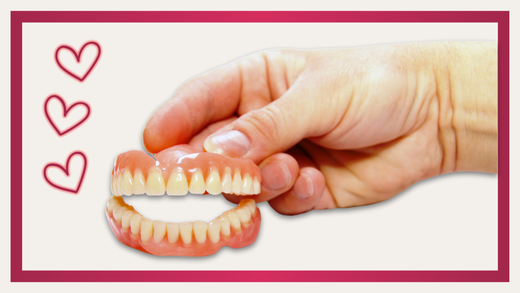
Breaking The Stigma Of Wearing Dentures
Share
Learning that all of your teeth need to be removed can be overwhelming. It's a difficult moment, and it may feel like no one around you truly understands what you're going through.
You’re not alone—36 million Americans live without any teeth, and partial tooth loss impacts the majority of adults in the United States.
There’s absolutely nothing to be ashamed of.
Tooth Loss Can Happen To Anyone, At Any Age, For A Variety Of Reasons
Am I Too Young for Dentures?
Society often attaches a negative stigma to missing or broken teeth, especially for younger individuals, with assumptions like poor hygiene or drug use made without understanding their story. While the average age for new denture wearers is 40–50, younger people face harsher judgment. Many experience tooth loss due to factors like inaccessible or costly dental care, not neglect or bad habits.
Comments like, "Did you see that young girl's teeth? She must not have ever brushed them," or "I wonder if she's addicted to drugs?" highlight the unfair and harmful assumptions people often make about dental health, ignoring the many reasons someone might experience tooth loss or dental issues.
Diabetes, smoking, a weak immune system, and poor oral hygiene all raise the risk of gum disease, the leading cause of tooth loss at any age. Gum disease, an inflammatory condition affecting the structures supporting teeth, impacts nearly 46% of adults aged 30 and older.
Other causes of tooth loss include dental decay, oral trauma (such as from injury or domestic violence), sports accidents, chronic illnesses (like autoimmune diseases, heart disease, diabetes, and high blood pressure), bone disease, lifestyle factors, childhood neglect, teeth grinding, and certain medications.
The Emotional Impact of Losing Your Teeth: Navigating the Mental Challenges

Our smile is everything and one of the first things people see when they look at us. Losing teeth, especially multiple ones, is a traumatic experience. It affects your appearance and ability to chew, speak, and interact socially or professionally. The emotional impact can be significant, affecting mental health and self-esteem while also requiring extensive, often uncomfortable dental procedures.
When teeth are missing or in poor condition, it can lead to a loss of confidence and make everyday activities more difficult. The changes to your facial structure can be hard to accept, and the emotional toll—depression, anger, stress, frustration, and anxiety—over replacing lost teeth can be overwhelming.
But Maybe Dentures Aren't So Bad After All
Just hearing the word "dentures" can be intimidating, especially with the stigma surrounding them, making younger people feel self-conscious or embarrassed.
Many believe dentures are only for older adults, so the idea of wearing them in your 20s or 30s can feel overwhelming and frightening. However, dentures offer a life-changing, cost-effective, and minimally invasive solution for replacing missing teeth. In fact, 90% of people without teeth wear dentures, with around 41 million people in the U.S. using them.
Modern, hand-crafted dentures restore natural functions, often providing a better fit and more comfort. The value of regaining your ability to talk, smile, and chew with confidence is priceless.
Some additional benefits of dentures include:
- Restoring your smile
- Eliminating social awkwardness
- Allowing you to eat without restrictions
- Making speaking easier
- Replacing facial support
- Helping to decrease bone loss
- Being easy to remove and clean
- Reducing further oral health issues
Adjusting To Life With Dentures Takes Time And Patience

It’s a process, but knowing that one in five adults globally wears dentures and nearly 45% of denture wearers are under 60 can be a huge confidence booster. You’re definitely not alone in this journey!
Some confidence-boosting tips include:
- Wearing your dentures as much as possible right away to get used to the feel.
- Practicing eating and speaking at home can help you feel more comfortable when you're out in public.
- Reading aloud at home can help you adjust to speaking with your new dentures.
Thanks to social media, people going through their tooth loss and denture journeys are sharing their experiences online. Platforms like YouTube, Facebook, and TikTok offer a great source of support. One example is "Life With Dentures Told by Tracy" on YouTube. Tracy is one of many denture vloggers helping to break the stigma around wearing dentures.
Here to Support You Every Step of the Way
Cushion Grip's Brand Ambassadors are on a mission to break the stigma, sharing their personal experiences and offering valuable insights along the way.
There’s absolutely nothing wrong with wearing dentures—after all, they’re simply a prosthetic designed to restore your smile and confidence.
The Toothless Fairy - YouTube
Ashley's Denture Diary! PEACE. LOVE. SMILES.
AshMac :Dear Dentures and Implants - YouTube
She made this channel to document, educate, inspire, & encourage in the hopes that she can help at least one person's journey towards dentures and/or implants easier and less traumatic.
"When I first came to the realization that I would eventually be losing all of my teeth, the shame, embarrassment, & anxiety were all too much for me to handle, so much that I kind of became somewhat of a hermit. As time approached my E-day. (extractions day) I stumbled across an entire community of the nicest people, the YouTube denture family."
